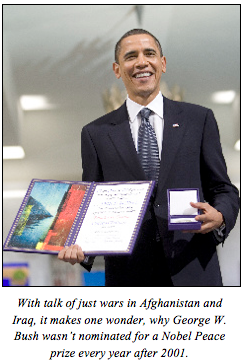by Trevor Sides
President Barack Obama channeled his inner George W. in his Nobel Peace prize acceptance speech Dec. 10.
Nearly a month ago, Obama was touring through Asia, bowing to emperors and spewing multicultural bilge about how “it’s very important for the United States not to assume that what is good for us is automatically good for somebody else.”
How time (and poll numbers lower than the 2008 stock market) change things. In Oslo, we watched this President promote the virtues of just wars and praise America’s military “enlightened self-interest” – all while accepting a Nobel Peace prize. Oh, the irony!
Obama’s acceptance speech had to account for several exegetical challenges: the widely-held view that his Peace prize award was woefully premature, a public growing more and more dissatisfied with his polices and ego, and the paradox of having sent 30,000 American troops to reinforce the Afghan war not a week earlier.
This was more foreign policy speech than acceptance speech. The day after Obama’s Afghanistan “surge” speech, Der Speigel declared, “Never before has a speech by President Barack Obama felt as false . . .” Obama looked at Oslo as a way to show that he does indeed have foreign policy backbone and moral clarity when it comes to the intricate mess of our postmodern world.
He spoke with shocking clarity and, surprise-surprise, a proper historical perspective on war and where history finds us now:
“Still, we are at war, and I’m responsible for the deployment of thousands of young Americans to battle in a distant land. Some will kill, and some will be killed. And so I come here with an acute sense of the costs of armed conflict — filled with difficult questions about the relationship between war and peace, and our effort to replace one with the other.”
Obama acknowledged that “violent conflict” won’t disappear anytime soon, and that, “There will be times when nations – acting individually or in concert – will find the use of force not only necessary but morally justified.” A paragraph and-a-half later, he made the ultimate G.W. comparison when he stated:
“For make no mistake: Evil does exist in the world. A non-violent movement could not have halted Hitler’s armies. Negotiations cannot convince al Qaeda’s leaders to lay down their arms. To say that force may sometimes be necessary is not a call to cynicism – it is a recognition of history; the imperfections of man and the limits of reason.”
And all the Daily Kos and Huffington Post doves now feel like Green Bay Packers fans watching Brett Favre play for the Minnesota Vikings. Total and utter betrayal.
He didn’t stop there: “Whatever mistakes we have made, the plain fact is this: The United States of America has helped underwrite global security for more than six decades with the blood of our citizens and the strength of our arms.”
What is going on here? Does Obama really believe this stuff, or is he just ponying up to the stark reality that his smooth, cadence-infused words can’t solve all of the world’s problems? Or could he be trying to assuage the fears of the moderates and independents who want a president with strong foreign policy?
We may never know for certain. Yet when he declared that, “ . . . yes, the instruments of war do have a role to play in preserving the peace,” he admitted to one of the core precepts of conservatism: peace through strength.
It makes one wonder, then, why George W. Bush wasn’t nominated for a Nobel Peace prize every year after 2001. He did more to bring peace and freedom to millions of people than anyone else in those dark days after the towers fell. Bush’s policies and words were ripped to hell by those who despised him for political gains – including the man who now holds the Nobel Peace prize, the man who espoused many of Bush’s same beliefs on war and human nature.
Oh, the irony.
Trevor Sides is a Liberty Features Syndicated writer for Americans for Limited Government.


